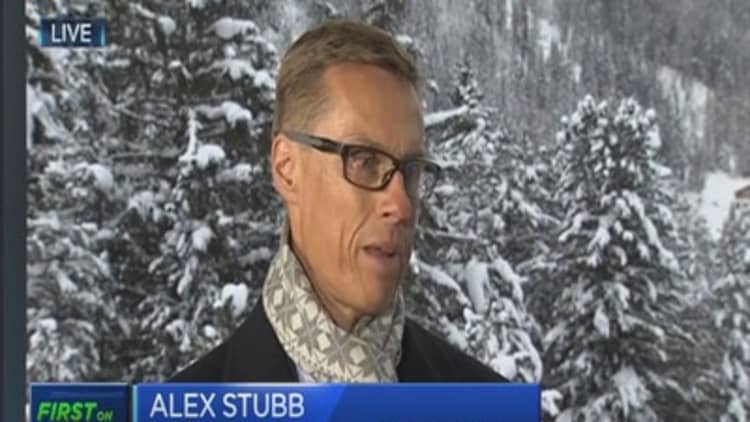


Europe needs to spend a lot more money on dealing with the migrant crisis, the head of the Eurogroup of finance ministers told CNBC on Thursday.
"We need to spend a lot more in dealing with the migrant crisis in the region where the vast majority of the refugees still are, in Syria, in Jordan, in Lebanon," Jeroen Dijsselbloem told CNBC on the sidelines of the World Economic Forum (WEF) in Davos.
"That requires extra money and many member states have put it up, we have made money available from the EU budget but we'll have to do more," he added. "That we need to open up more budget for the crisis is very clear to me."
Europe's migrant crisis has been a hot talking point at the World Economic Forum (WEF) in Davos this year, but the region's measures to deport migrants "who don't deserve international protection" need to be improved, the vice-president for Jobs, Growth and Competitiveness in the European Commission, told CNBC.
"We have to treat newcomers as human beings. People want to come to Europe to have a better life and we have to respect their will but we have to look at how sustainable the current influx is," Jyrki Katainen said on Thursday on the sidelines of WEF in Davos.
"We have a relocation scheme, we're also helping the member states take care of their external borders because it's the precondition for freedom of movement in Europe. But we also we are making our procedures faster to return those who don't deserve international protection."
The refugee crisis in Europe has been a talking point at Davos this year, especially as more than one million migrants have arrived in the continent in 2015, most of whom fleeing war and persecution in the Middle East.
However, with divisions across Europe over controlling the movement of migrants and questions over integration, concerns are being raised over the effectiveness of the region's response.
While the German President Joachim Gauck told an audience at Davos on Wednesday that a cap on migrants might be "morally and politically right," Sweden's prime minister told CNBC yesterday that it was wrong to say that refugees lead to insecurity and that the crisis could be controlled without closing borders.
Katainen conceded that Europe faced a huge challenge and that systems needed to be improved to ensure that those who were not asylum seekers could be returned to their countries of origin.
"Our systems haven't been designed so this many people can come in in this short time period so it is really a big challenge for European societies but as I said, we have to treat newcomers as human beings while making sure the systems are fair – that everyone who deserves international protection gets our protection but those that don't deserve it must be returned as quickly as possible."
The migrant crisis has complicated the outlook and political and economic relations in Europe amid a nascent recovery yet residual unemployment.
In 2014, the commission unveiled a 300 billion euro ($327 billion) investment plan aimed at reviving Europe's slow economy. A lot of that money was aimed at creating more jobs in a region where unemployment is still a problem, particularly in southern Europe.
Greece and Spain have the highest jobless rates in the euro zone, with the latest figures showing that 24.6 percent of adults are unemployed in Greece and 21.4 percent in Spain, according to Eurostat. For those aged between 16 and 25, the situation is even worse with almost 50 percent of youg people without a job in Greece, and 47.5 percent in Spain.
Katainen said the European Commissions' program – known as the "Juncker plan" after the Commission's President – was moving forward and jobs were being created.
"The plan is up and running, so we have a new fund called the European Fund for Strategic Investment (EFSI) and it has signed concrete agreements with the banks to finance SMEs (small and medium-sized businesses."
"So we have a current lead of financing projects worth 7 billion euros so far and this will create something like 120,000 jobs and 50 billion euros in new investments."






